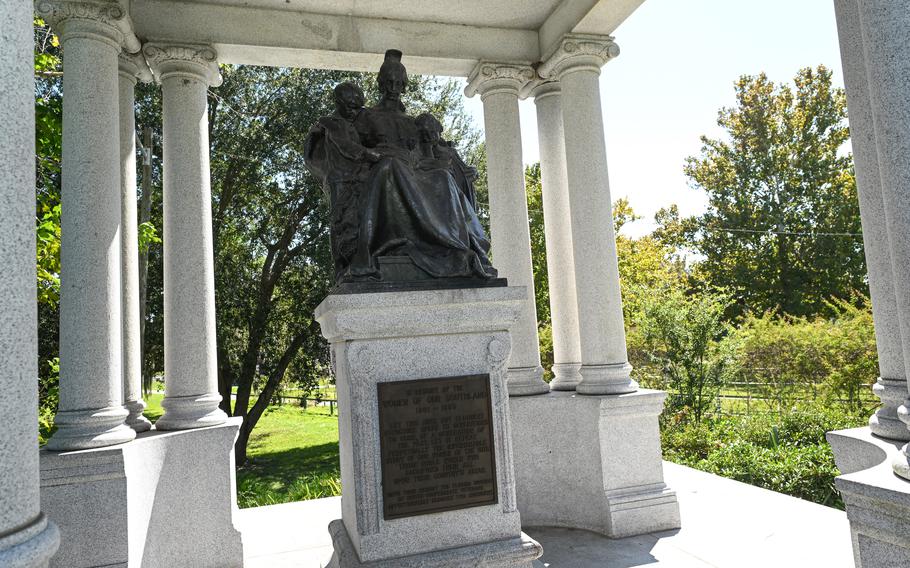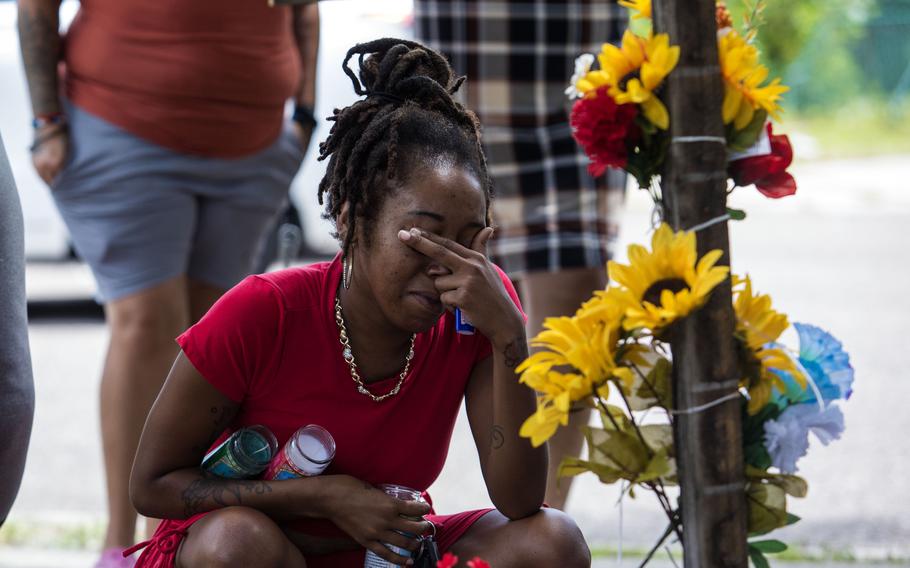
A memorial to commemorate women of the Confederacy, shown in September, was the centerpiece of a city park in Jacksonville, Fla., for more than a century — until it was dismantled Wednesday morning. (Joshua Lott/The Washington Post)
A massive Confederate memorial in a city park in Jacksonville, Fla., came down Wednesday morning after years of controversy over the statue, preempting proposed state legislation that would punish local officials who vote for the removal of such markers.
On orders of Mayor Donna Deegan, crews moved in equipment overnight to Springfield Park — formerly Confederate Park — and had the first part of “In Memory of Our Women of the Southland” on the ground shortly after dawn. Though many residents had long demanded such action, it still came as a surprise as the sun rose — with a TV station’s live stream allowing both critics and supporters of the monument to watch its dismantling.
Deegan (D) had promised after her election in May to have the statue taken down but couldn’t get agreement from the city council’s 19 members. Then last month, a Republican state representative from Duval County introduced a measure to fine local officials who vote to remove historical monuments.
The mayor said in a statement that she used her own authority — and nearly $200,000 in private funds — to have the work done. Early cost estimates were as high as $1.3 million.
“Symbols matter,” Deegan said in explaining why she thought the statue had to go. “They tell the world what we stand for and what we aspire to be. By removing the Confederate monument from Springfield Park, we signal a belief in our shared humanity.”
Her statement noted that the memorial “was erected during the peak of early 20th century Confederate monument-building, part of a widespread campaign to promote and justify Jim Crow laws in the South and intimidate African Americans.”
One Republican council member reacted angrily. “Deegan is our Mayor, not our Monarch,” Nick Howland said on X, formerly Twitter. “Waiting until nightfall before taking a backhoe to the Women of the South monument is blatant overreach.”

A woman takes a moment in August at a makeshift memorial outside a Dollar General store in Jacksonville, Fla., where three people were fatally shot. (Saul Martinez for The Washington Post)
Jacksonville continues to grapple with its history. In August, three Black people were fatally shot by a White man with a swastika-decorated AR-15-style rifle. The gunman — who had targeted a Dollar General store in a Black neighborhood near Edward Waters University, a historically Black college — killed himself before police arrived.
The murders shook the city and, for many, brought about a reckoning with Jacksonville’s racist past. “Women of the Southland, 1861-1865” was for many an unwelcome reminder of that past.
The 12-column, 41-foot-tall memorial features three figures high atop a pedestal: a mother embracing her two children. The plaque included at its dedication made its intent clear. “Let this mute but eloquent structure speak to generations to come of a generation of the past,” it read. “Let it repeat perpetually the imperishable story of our women of the ‘60s, those noble women who sacrificed their all upon their country’s altar.”
The monument, erected in 1914 after a fundraising effort by the Florida division of the United Confederate Veterans, was the centerpiece of what for more than another century would be called Confederate Park.
Deegan’s support gave protesters hope but also prompted pushback. State Rep. Dean Black proposed legislation he titled “Protection of Historical Monuments and Memorials,” which calls on Florida’s secretary of state to ensure “that each nonmilitary Florida monument or memorial is not removed, damaged, or destroyed.”
On Wednesday, Black called on the Jacksonville council to replace what had been taken down.
“History belongs to all Floridians,” he said in an interview. “To destroy a memorial to that history, you diminish every Floridian, wherever they are in the state. And we need to protect our history and add to it, not subtract from it.”
The first changes came in 2020 with the park’s renaming and the removal of a statue of a Confederate soldier across from City Hall. Yet still the monument remained, despite weekly protests from the group Take Em Down Jax and others.
A spokesman for Deegan’s office said Black’s proposed legislation “had no bearing” on the timing of the mayor’s order. “We have been exploring options since the first day in office, and the planning process took several months,” Phillip Perry said in an email. “We wanted to ensure public safety around the removal during a slower week.”
Crowds, singing and chanting, gathered at Springfield Park as the crews worked and wound thick straps around the three bronze figures. A fourth figure, which had stood atop the dome holding a furled Confederate flag, had already been pulled down and placed on its side in the grass.
Tim Gilmore, a lifelong Jacksonville resident and professor at Florida State College, has written extensively about the city’s racist history. He credits Deegan with taking action.
“Mayor Deegan has caught us up with where we should have been sometime well back in the 20th century,” Gilmore said before heading to Springfield Park to watch the activity. “Deegan has put an end to the Lost Cause lie in Jacksonville.”